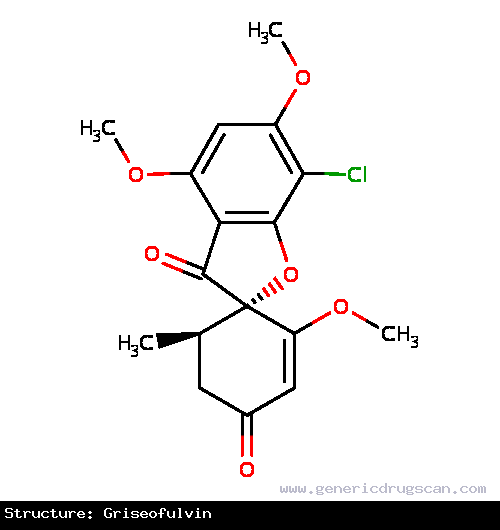Griseofulvin Drug: Indication, Dosage, Precaution, Side Effect , Storage, Category Type and corresponding Brands - www.genericdrugscan.com
Griseofulvin
Drug Status in USA : ApprovedDrug Status in Canada : Approved
pronunciation
pronounced as (gri see oh ful' vin)
Why is this medication prescribed?
Griseofulvin is used to treat skin infections such as jock itch, athlete's foot, and ringworm; and fungal infections of the scalp, fingernails, and toenails.
This medication is sometimes prescribed for other uses; ask your doctor or pharmacist for more information.
How should this medicine be used?
Griseofulvin comes as a tablet, capsule, and liquid to take by mouth. It is usually taken once a day or can be taken two to four times a day. Although your symptoms may get better in a few days, you will have to take griseofulvin for a long time before the infection is completely gone. It is usually taken for 2 to 4 weeks for skin infections, 4 to 6 weeks for hair and scalp infections, 4 to 8 weeks for foot infections, 3 to 4 months for fingernail infections, and at least 6 months for toenail infections. Follow the directions on your prescription label carefully, and ask your doctor or pharmacist to explain any part you do not understand. Take griseofulvin exactly as directed. Do not take more or less of it or take it more often than prescribed by your doctor.
Shake the liquid well before each use to mix the medication evenly.
Continue to take griseofulvin even if you feel well. Do not stop taking griseofulvin without talking to your doctor.
What are the precautions to be followed?
Before taking griseofulvin,- tell your doctor and pharmacist if you are allergic to griseofulvin, or any other medications.
- tell your doctor and pharmacist what prescription and nonprescription medications you are taking, especially anticoagulants ('blood thinners') such as warfarin (Coumadin), oral contraceptives, cyclosporine (Neoral, Sandimmune), phenobarbital (Luminal), and vitamins.
- tell your doctor if you have or have ever had liver disease, porphyria, lupus, or a history of alcohol abuse.
- tell your doctor if you are pregnant, plan to become pregnant, or are breast-feeding. If you become pregnant while taking griseofulvin, call your doctor.
- tell your doctor if you drink alcohol.
- you should plan to avoid unnecessary or prolonged exposure to sunlight and to wear protective clothing, sunglasses, and sunscreen. Griseofulvin may make your skin sensitive to sunlight.
What are possible side effects of this medication ?
Griseofulvin may cause side effects. Tell your doctor if any of these symptoms are severe or do not go away:- headache
- upset stomach
- vomiting
- diarrhea or loose stools
- thirst
- fatigue
- dizziness
- faintness
- fever
- sore throat
- skin rash
- mouth soreness or irritation
How to store the medication and dispose it of after its use later?
Keep this medication in the container it came in, tightly closed, and out of reach of children. Store it at room temperature and away from excess heat and moisture (not in the bathroom). Keep the liquid away from light. Do not freeze. Throw away any medication that is outdated or no longer needed. Talk to your pharmacist about the proper disposal of your medication.
Drug Category/Class
- Anti-Bacterial Agents
- Antifungal Agents
- Antibiotics
- Antifungals for Topical Use
- Antifungals for Dermatological Use
- Dermatologicals
- Antifungals for Systemic Use
- Cytochrome P-450 CYP1A2 Inhibitors
- Cytochrome P-450 CYP1A2 Inducers
- CYP3A4 Inhibitors
- Antibiotics
- Antifungals for systemic use
| Prescribed | For the treatment of ringworm infections of the skin, hair, and nails, namely: tinea corporis, tinea pedis, tinea cruris, tinea barbae, cradle cap ... |
| Weight : | 352.766 |
| Structure | Griseofulvin |
 | |
| Formula | C17H17ClO6 |
Griseofulvin has 49 Brands listed
Search Generic Drugs alphabetically
